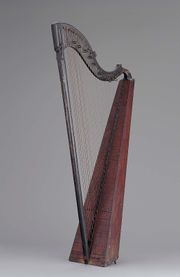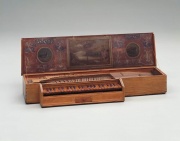Difference between revisions of "Fir"
| Line 21: | Line 21: | ||
* Alden Identification Services, Microscopic Wood Identification: [https://wood-identification.com/wood-types/ Link] | * Alden Identification Services, Microscopic Wood Identification: [https://wood-identification.com/wood-types/ Link] | ||
* H. A. Alden, A.C. Wiedenhoeft, "Qualified Determination of Provenance of Wood of the Firs (Abies spp. Mill) Using Microscopic Features of Rays: An Aid to Conservators, Curators and Art Historians" AIC Poster, reprinted online at [http://www.si.edu/scmre/abies.html http://www.si.edu/scmre/abies.html] | * H. A. Alden, A.C. Wiedenhoeft, "Qualified Determination of Provenance of Wood of the Firs (Abies spp. Mill) Using Microscopic Features of Rays: An Aid to Conservators, Curators and Art Historians" AIC Poster, reprinted online at [http://www.si.edu/scmre/abies.html http://www.si.edu/scmre/abies.html] | ||
| − | |||
* Schoch, W., Heller, I., Schweingruber, F.H., Kienast, F., 2004:[http://www.woodanatomy.ch/ Wood anatomy of central European Species]: Silver Fir, [http://www.woodanatomy.ch/species.php?code=ABAL Abies alba Mill.] | * Schoch, W., Heller, I., Schweingruber, F.H., Kienast, F., 2004:[http://www.woodanatomy.ch/ Wood anatomy of central European Species]: Silver Fir, [http://www.woodanatomy.ch/species.php?code=ABAL Abies alba Mill.] | ||
| − | |||
* Wikipedia: https://en.wikipedia.org/wiki/Fir (accessed April 2020) | * Wikipedia: https://en.wikipedia.org/wiki/Fir (accessed April 2020) | ||
| − | |||
* R. J. Gettens, G.L. Stout, ''Painting Materials, A Short Encyclopaedia'', Dover Publications, New York, 1966 Comment: Firs include two species: Abies (true firs) and Picea (spruce) | * R. J. Gettens, G.L. Stout, ''Painting Materials, A Short Encyclopaedia'', Dover Publications, New York, 1966 Comment: Firs include two species: Abies (true firs) and Picea (spruce) | ||
| − | |||
* F. H. Titmuss, ''Commercial Timbers of the World'', The Technical Press Ltd., London, 1965 | * F. H. Titmuss, ''Commercial Timbers of the World'', The Technical Press Ltd., London, 1965 | ||
| − | |||
* ''Dictionary of Building Preservation'', Ward Bucher, ed., John Wiley & Sons, Inc., New York City, 1996 | * ''Dictionary of Building Preservation'', Ward Bucher, ed., John Wiley & Sons, Inc., New York City, 1996 | ||
| − | |||
* ''Van Nostrand's Scientific Encyclopedia'', Douglas M. Considine (ed.), Van Nostrand Reinhold, New York, 1976 | * ''Van Nostrand's Scientific Encyclopedia'', Douglas M. Considine (ed.), Van Nostrand Reinhold, New York, 1976 | ||
| − | |||
* ''The American Heritage Dictionary'' or ''Encarta'', via Microsoft Bookshelf 98, Microsoft Corp., 1998 | * ''The American Heritage Dictionary'' or ''Encarta'', via Microsoft Bookshelf 98, Microsoft Corp., 1998 | ||
| − | |||
* ''Encyclopedia Britannica'', http://www.britannica.com Comment: "fir" [Accessed October 17, 2001]. | * ''Encyclopedia Britannica'', http://www.britannica.com Comment: "fir" [Accessed October 17, 2001]. | ||
| − | [[Category:Materials database]] | + | [[Category:Materials database]][[Category:MWG]][[Category: Wood]] |
Latest revision as of 11:34, 2 October 2024
Description
Over 50 species from the genus Abies with the exception of the Douglas fir which is of the genus Pseudotsuga. Fir trees are found in North America, Europe and Asia, primarily occurring in mountain ranges. These are large trees reaching heights of 80 m with trunk diameters up to 4 m. Wood from fir trees is soft, light color, straight grain and has a coarse texture. The timber is resistant to insect attack and has been used for ship building and general construction, usually for interior framing. Fir trees are popular Christmas trees due to their aromatic foliage and their tendency to retain dried leaves. The Canada balsam fir (A. balsamea) produces an oleoresin used to mount samples on glass slides for microscopic analysis. Burgundy pitch is obtained from the silver fir (A. alba) found in the Alps, Caucasian and Ural mountains. Other common firs are the white fir (A. concolor) , noble fir (A. procera), and grand fir (A. grandis).
Synonyms and Related Terms
Abies; sapin (Fr.); abeto (Esp., Port.); abete (It.); White Deal; Norway spruce; Douglas fir; balsam fir; noble fir; silver fir; grand fir
Physical and Chemical Properties
- Color: light color
- Grain: straight with coarse texture
- Density = 28-33 ppcf
Working Properties
Fir tree studs typically have a high grading for appearance and strength. The soft wood readily accepts plastic or metal fasteners with a high retention. The wood is less rot resistant than pine and can be used for exterior applications when painted or sealed.
Resources and Citations
- The Wood Database: Abies species
- Alden Identification Services, Microscopic Wood Identification: Link
- H. A. Alden, A.C. Wiedenhoeft, "Qualified Determination of Provenance of Wood of the Firs (Abies spp. Mill) Using Microscopic Features of Rays: An Aid to Conservators, Curators and Art Historians" AIC Poster, reprinted online at http://www.si.edu/scmre/abies.html
- Schoch, W., Heller, I., Schweingruber, F.H., Kienast, F., 2004:Wood anatomy of central European Species: Silver Fir, Abies alba Mill.
- Wikipedia: https://en.wikipedia.org/wiki/Fir (accessed April 2020)
- R. J. Gettens, G.L. Stout, Painting Materials, A Short Encyclopaedia, Dover Publications, New York, 1966 Comment: Firs include two species: Abies (true firs) and Picea (spruce)
- F. H. Titmuss, Commercial Timbers of the World, The Technical Press Ltd., London, 1965
- Dictionary of Building Preservation, Ward Bucher, ed., John Wiley & Sons, Inc., New York City, 1996
- Van Nostrand's Scientific Encyclopedia, Douglas M. Considine (ed.), Van Nostrand Reinhold, New York, 1976
- The American Heritage Dictionary or Encarta, via Microsoft Bookshelf 98, Microsoft Corp., 1998
- Encyclopedia Britannica, http://www.britannica.com Comment: "fir" [Accessed October 17, 2001].

